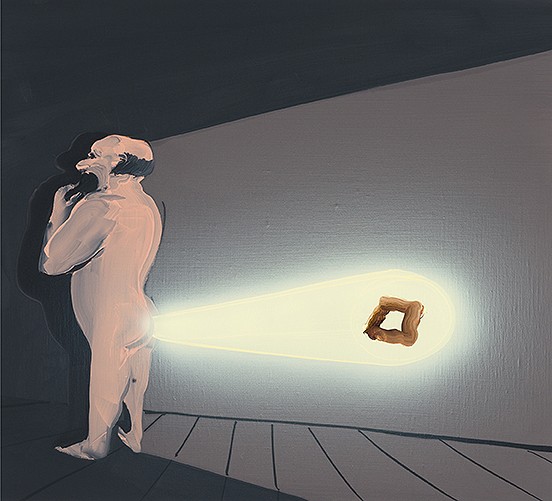Tala Madani
Rear Projection
15 Apr - 24 Aug 2014

Tala Madani
Rear Projection: Form, 2013
Oil on linen
Courtesy of the artist and Pilar Corrias Gallery, London
Rear Projection: Form, 2013
Oil on linen
Courtesy of the artist and Pilar Corrias Gallery, London
TALA MADANI
Rear Projection
15 April – 24 August 2014
Curated by Abi Spinks
Exhibition Session: Beyond Figura
In her work, Tala Madani (Tehran, Iran, 1981) reflects on masculinity, group dynamics, sexuality and power plays, exploring these topics with humour and impossible cartoon violence.
Madani imagines the bizarre, nonsensical rituals of the all-male domain. Her paintings of groups of men in their underwear or sleepwear, blissfully unaware of-and apparently enjoying-their own predicaments and the company of their fellows, are pervaded by an absurd sense of exposure. Madani has remarked that she "lets the subconscious speak".
Her paintings and digital animations depict the bodily functions of men in intensely private, strangely shared moments. Beyond the bodily aspect, she says that some of her works speak of a religious, spiritual or sexual ecstasy. These pieces are like disturbing, hopelessly tangled webs that critique male power cliques.
Madani has commented that she uses humour to "bring everyone's guard down". In her paintings, competitive violence is reduced to an absurd impotence. The artist also applies supposedly female colours or patterns to quintessentially male activities.
In one of her recent series Madani depicts children from a classic learn-to-read series, books that reflect the conservative gender roles of the 1950s which the artist herself used to learn English as a teenager newly arrived in the United States. Madani presents those children alongside her customary male figures, engaged in behaviour that may be good or evil, thereby subverting the original illustrations and upsetting the children's ordered existence through their anarchic actions.
Madani's artworks often seem to have a narrative quality, and she finds inspiration in the graphic novels of Alan Moore and Robert Crumb. Her oeuvre also contains numerous art-historical references that range from Abstract Expressionism to Minimalism, with nods to Jackson Pollock's drip paintings and Morris Louis's poured paint technique.
Rear Projection
15 April – 24 August 2014
Curated by Abi Spinks
Exhibition Session: Beyond Figura
In her work, Tala Madani (Tehran, Iran, 1981) reflects on masculinity, group dynamics, sexuality and power plays, exploring these topics with humour and impossible cartoon violence.
Madani imagines the bizarre, nonsensical rituals of the all-male domain. Her paintings of groups of men in their underwear or sleepwear, blissfully unaware of-and apparently enjoying-their own predicaments and the company of their fellows, are pervaded by an absurd sense of exposure. Madani has remarked that she "lets the subconscious speak".
Her paintings and digital animations depict the bodily functions of men in intensely private, strangely shared moments. Beyond the bodily aspect, she says that some of her works speak of a religious, spiritual or sexual ecstasy. These pieces are like disturbing, hopelessly tangled webs that critique male power cliques.
Madani has commented that she uses humour to "bring everyone's guard down". In her paintings, competitive violence is reduced to an absurd impotence. The artist also applies supposedly female colours or patterns to quintessentially male activities.
In one of her recent series Madani depicts children from a classic learn-to-read series, books that reflect the conservative gender roles of the 1950s which the artist herself used to learn English as a teenager newly arrived in the United States. Madani presents those children alongside her customary male figures, engaged in behaviour that may be good or evil, thereby subverting the original illustrations and upsetting the children's ordered existence through their anarchic actions.
Madani's artworks often seem to have a narrative quality, and she finds inspiration in the graphic novels of Alan Moore and Robert Crumb. Her oeuvre also contains numerous art-historical references that range from Abstract Expressionism to Minimalism, with nods to Jackson Pollock's drip paintings and Morris Louis's poured paint technique.
